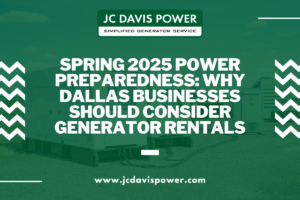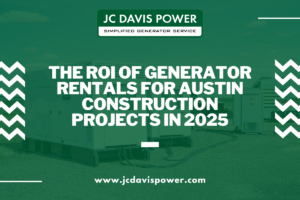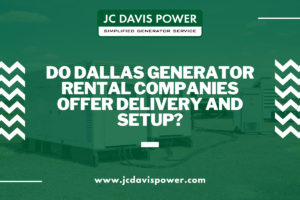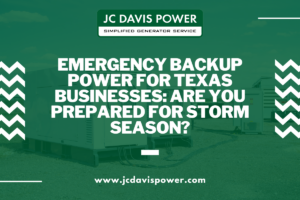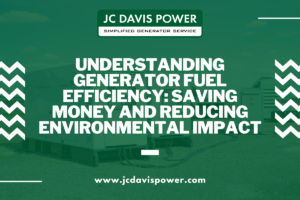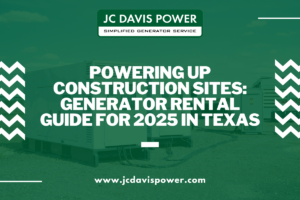Portable generators supply reliable electricity for worksites without access to the power grid. Leading brands offer heavy-duty models specifically built for the demands of construction.
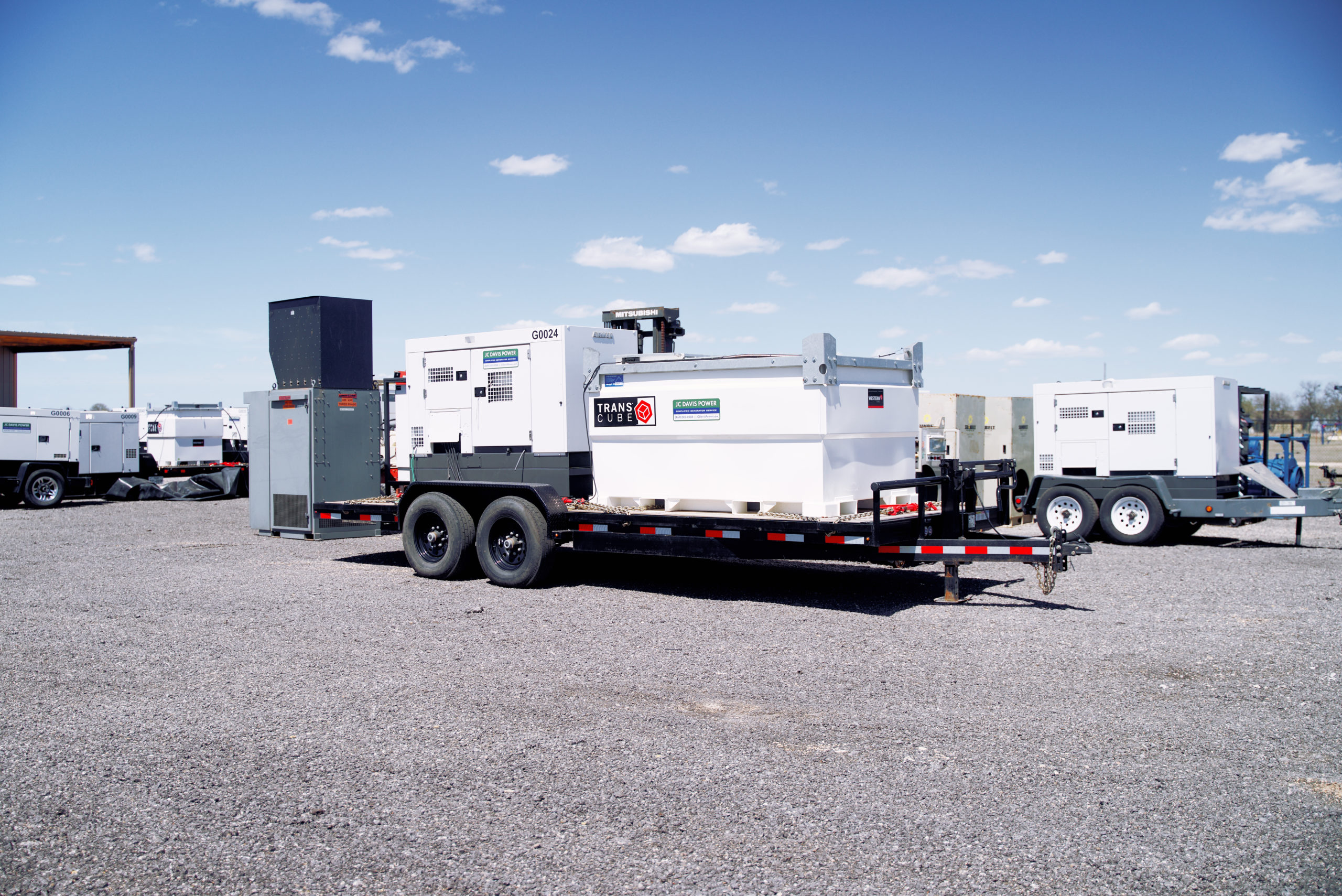
Construction crews often need to bring power with them, wherever the job takes them. Generators offer a flexible way to meet those electricity needs when working off the grid. They allow you to run tools, equipment, and lighting without relying on temporary utility hookups.
Defining construction generators
Portable generators are engine-powered machines that generate electricity. They include outlets and plugs to connect tools directly or distribute power through cables and extension cords.
Trusted brands like Caterpillar (CAT), John Deere, and Honda build rugged, durable generators made to withstand tough conditions on construction sites. You can get compact “suitcase” generators that produce a few thousand watts up to trailer-mounted mega-generators over 1MW.
Meeting the power demands of construction projects
The biggest advantage of generators is being able to tap into engine power and create electricity on demand. Instead of bringing in expensive, temporary power poles and cables, you can simply tow a generator to the site.
Even in remote areas or frequently changing locations on large projects, your team stays productive with a reliable power source. Your crew gains the flexibility to work without restrictions or downtime.
Types of Generators Used at Construction Sites
There are two main fuel options for generators on job sites – diesel and propane/natural gas. Each has pros and cons to consider.
Diesel construction generators
Diesel generators are common for construction because the engines can reliably produce plenty of power. Leading manufacturers like Caterpillar use proven, off-the-shelf diesel engines paired to electrical generators.
You’ll find many compact “portable” diesel generators in the 5-30kW range with wheel kits for maneuvering around worksites. Larger diesel gensets go up to 2MW for running very heavy loads. Their fuel efficiency and low emissions make them a solid choice.
Alternative fuel generators
Propane or natural gas generators also see lots of use by construction crews. They produce fewer emissions, run more quietly, and the fuel is easier to come by.
While diesel has a higher energy density, a comparable gas generator may cost less to operate overall. Gasoline is seldom used anymore due to its volatility and emissions.
Features Construction Crews Need From Generators
Each job site has its own power needs and challenges. Here are key features to look for in construction site generators:
Quiet operation suitable for urban, residential builds
Noise regulations may require generators below a certain decibel level, especially on urban infill projects. Enclosed mufflers, insulated casings, and other noise-reduction technologies make the quietest generators whisper-silent.
Easy mobility around evolving job locations
Look for all-terrain tires, lifting eyelets, and trailer mount options to reposition generators as the project progresses. Having the flexibility to place your power where you need it saves significant time and effort.
Ruggedness and weather resistance
Your generator will endure long days in the elements, high traffic, vibrations, and more. Seek heavy-plate enclosures, weatherproof components, and seals to prevent failures. Easily serviceable filters and parts also minimize downtime.
Safety Considerations For Construction Site Generators
Like any machine, generators present some safety risks. Proper precautions go a long way to prevent accidents and injuries:
Proper fuel storage and handling
Follow codes and guidelines for containing fuel spills, ventilating fumes, and refueling carefully. Place generators away from high-traffic areas or blind corners. Practice an emergency response plan.
Electrical safety
Using transfer switches, grounding properly, and overcurrent protection are vital. Ensure cords and cables are sized and rated for the loads. Inspect them frequently for damage. Keep electrical components high and dry.
Emissions and ventilation precautions
Diesel exhaust and gas vapors can accumulate in confined spaces. Carbon monoxide sensors should trigger automatic generator shutdown. Provide ample perimeter ventilation and air intakes.
How To Size Generators For Your Power Requirements
When sizing a generator, it is important to carefully evaluate your power requirements to ensure you get a generator that can handle the load. Here are some key steps to follow:
Inventory Electrical Equipment
Make a comprehensive list of all tools, appliances, lights, HVAC systems, and other items that will require generator power. Be as detailed as possible, including specifications like wattage ratings.
Calculate Total Running Watts
Add up the running or rated wattage for all items that could potentially run simultaneously. This is your minimum required generator capacity. Remember:
- Start-up surge wattage can briefly triple the rated wattage when items first turn on. Factor in start-up surges.
- Consider which items are essential versus non-essential so you can prioritize.
Evaluate Voltage, Phase, and Plug Compatibility
- Most common configurations are 120V/240V single phase and 208V/480V three phase. Match your required voltage and phase.
- Double-check all outlet plug types needed now or in the future, and choose a generator that can supply the necessary configuration. Consider wiring modifications if needed.
Add Cushion for Future Growth
Add at least 20% as an extra buffer above your calculated loads. It costs much less to get extra capacity now rather than replace an undersized generator later.
Properly sizing your generator ensures reliable backup power whenever you need it. Allow flexibility for additional tools and equipment down the road. An experienced electrician can help inventory electrical loads and recommend ideal generator specifications. Investing in adequate wattage reduces the risk of overload and protects your equipment.
Where To Rent Or Purchase Construction Site Generators
Renting generators short-term is convenient and affordable for most construction projects. Local equipment rental companies offer multiple delivery and pickup options to suit your schedule. They handle all maintenance and repairs while providing the latest generator models with advanced features.
Consider renting generators if:
- You only need power for a short-term project
- You want the flexibility to adjust generator sizes for different needs
- You don’t require a generator full-time on site
The main benefits of renting include:
- Lower upfront costs instead of a large capital expenditure
- Access to well-maintained, modern equipment
- Multiple generator size options from 5KW to over 500KW
Purchase generators if you have long-term, frequent, or continuous projects in mind. Owning your generator lets you recoup the initial investment over time and eliminates recurring rental fees. Carefully weigh the capital outlay and regular maintenance costs against your current and future project timelines and power requirements.
Consider buying generators if:
- You have an ongoing need for a generator across multiple job sites
- Your projects require continuous backup power for over 6 months
- You can realize cost savings from ownership over renting
If purchasing, leverage manufacturer or dealer financing promotions where possible to offset the initial cash outlay. Be sure to factor in proper generator storage, permits, fuel costs and professional maintenance into your budget.
Operating, Maintaining, and Repairing Your Generators
To keep generators performing optimally and avoid costly repairs down the road:
- Perform daily walkaround inspections and preventative maintenance per the manual.
- Check fluid levels, belts, hoses, wiring connections, batteries, etc.
- Log hours run and record scheduled service for accurate maintenance tracking.
- Annual load bank testing checks the entire electrical system under controlled load conditions while periodic tune-ups examine critical components.
- Tune-ups should examine hoses, wiring connections, sensors, fuel systems, etc.
- Replace air and oil filters, spark plugs, etc. per manual specifications.
- Fix minor issues immediately to prevent bigger problems.
- Listen for unusual noises, vibrations, smells, etc. that may indicate issues.
- Inspect exhaust color along with monitoring gauges to identify problems early.
- For troubleshooting issues:
- Check for clogged air filters, water in fuel, discharge leaks, and governor/AVR issues before assuming major failure.
- Consult troubleshooting guides in the manual.
- Most problems like bad sensors, fouled injectors, etc. are easily correctable.
Proactive maintenance and timely repairs will extend the generator’s service life. Keep detailed records to spot patterns and deterioration over time. Major overhauls or replacements should be viewed as a last resort.
Innovations In Generator Technology For Construction
Today’s state-of-the-art job site generators boast impressive new technologies that improve efficiency, connectivity, and sustainability:
Hybrid models combine diesel and battery power, improving fuel efficiency and performance. The battery helps handle peak power demands, while the diesel engine can run at a steady, optimal speed rather than constantly revving up and down. This improves generator life expectancy and reduces noise.
- Hybrid generators utilize advanced control systems to seamlessly switch between battery and diesel. Some models prioritize battery first, tapping into diesel only when needed.
Smart interfaces enable advanced monitoring, control, and diagnostics via computer or mobile apps. Users can remotely check a generator’s fuel level, runtime, due for maintenance alerts, and more. Some interfaces even allow the ability to remotely start, stop, and calibrate generators. This allows for preventative maintenance and rapid response time if issues arise.
- Remote access portals offer real-time dashboard views of the entire generator fleet status. Cloud-based analytics can optimize fuel usage and identify usage trends.
Solar power pairing allows generators to charge batteries during daylight hours. The stored solar energy then displaces fuel usage at night to save on refueling costs. Some generators feature solar panels integrated into the housing itself.
- Smart generators can be programmed to use solar first, turning to diesel only when solar output is low. This further maximizes solar capabilities and fuel savings.
By embracing hybrid technology, connectivity, and solar power, today’s most advanced generators deliver improved total cost of ownership through enhanced efficiency, flexibility, and sustainability. Contractors can do more with less fuel while benefiting from remote operability and data-driven insights.
Top Construction Generator Brands and Models
When you need tried-and-true performance, veterans of the construction industry trust these names:
- Caterpillar makes exceptionally rugged, durable generators built for the biggest jobs. The XQ2000 boasts a mammoth 2000kW output for high-demand applications.
- Generac builds specialized generators engineered specifically for builders and contractors. The IQ2000 inverter generator delivers clean, quiet 2000-watt power in a compact unit.
- Kohler offers premium generators packed with innovations and features. Their gaseous 20RESL generator provides 20kW of reliable power for rental applications.
Conclusion: Finding Your Perfect Construction Site Generator
Carefully evaluate your construction power requirements including:
- Peak and typical electricity demand
- Voltage, outlets, and phasing
- Run time per day/week, duration of project
Compare renting vs buying options. Contact us for consulting generator sizing guides for rent.
